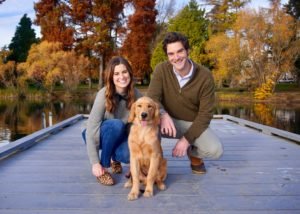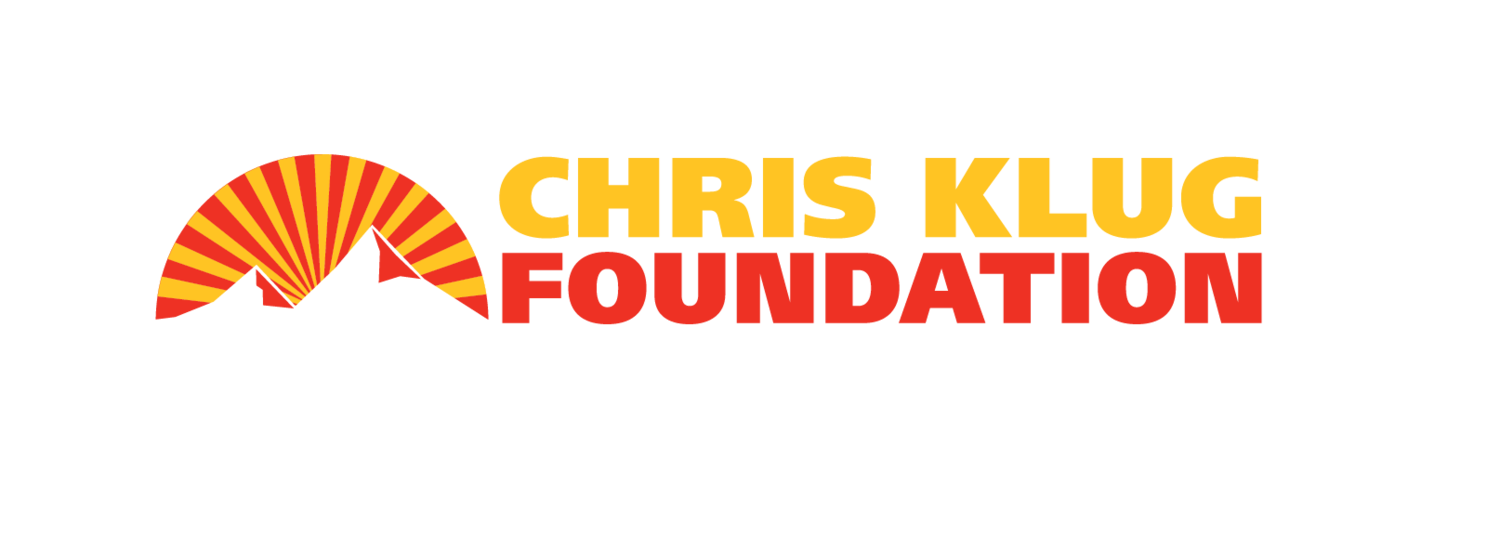How Receiving a Transplant Inspired a Career
Written by Alex Kula, liver transplant recipient. Edited by CC Cunningham, CKF Program Manager.Life is only as normal as we perceive it to be. Prior to any of my health challenges, my life almost felt too normal.
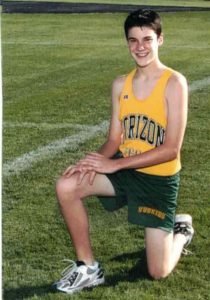 I first noticed something was amiss when I was 15 years old, after finishing last place in a cross-country race. It wasn't the last-place finish that was unusual (I was a highly mediocre runner), it was the fact that a competitor who had decided to walk the entire race beat me. Furthermore, my snail-like pace felt so strenuous, I thought I was going to die. Over the next week, I came to understand that this feeling was completely justified: I ended up being diagnosed with Type 1 diabetes and ulcerative colitis. In addition to this diagnosis, it appeared I was also dealing with some sort of autoimmune issue, after several liver function tests came back abnormal.
I first noticed something was amiss when I was 15 years old, after finishing last place in a cross-country race. It wasn't the last-place finish that was unusual (I was a highly mediocre runner), it was the fact that a competitor who had decided to walk the entire race beat me. Furthermore, my snail-like pace felt so strenuous, I thought I was going to die. Over the next week, I came to understand that this feeling was completely justified: I ended up being diagnosed with Type 1 diabetes and ulcerative colitis. In addition to this diagnosis, it appeared I was also dealing with some sort of autoimmune issue, after several liver function tests came back abnormal.
It took a full year to really make sense of the last finding. After seeing several specialists and undergoing a battery of tests, I was finally diagnosed with primary sclerosing cholangitis (PSC). Despite this, I tried to keep my life as normal as possible: going to school, hanging out with friends, and continuing to run cross-country. Beneath the surface however, my liver was slowly becoming more and more scarred because of this relentless disease.I learned early on that there is only so much you can control in life. Once I was diagnosed, I strictly followed all of my doctor's orders and tried my best to retain a healthy, active lifestyle. Although my actions weren't able to slow the progression of my disease, they at least kept my body and mind in the best shape possible. This approach also kept me moving forward and able to live a seemingly normal life.Fast forward several years and there I was: 19 years old and my liver was failing. At that point, the only thing that could save me was a liver transplant. It took me a while to come to grips with that reality. To receive a transplant, I needed to put my life on pause. Sure, I wasn't feeling great, but I loved to learn and I loved my college classes and I loved spending time with my friends. The same enthusiasm that helped me persevere through my illness before made it difficult for me to slow down and focus on my declining health now. Nonetheless, there were some realities that I couldn't deny: my skin began to take on a yellow-orange hue; most nights, I would sleep for at least 12 hours, but still felt exhausted when I woke up. In short, I was running out of gas. My parents saw what was happening to me and tried to help me overcome my fears, focus on my health, and figure out the best way to undergo swapping out my sick liver.While I waited on the transplant waitlist, my condition continued to deteriorate. I spent time at the top of the waitlist, but a match for a new liver just wasn't available. As I became sicker and sicker, the situation became more dire. Worst of all, there was nothing I could do but wait and hope. With some good fortune, my physicians were able to successfully perform a complex procedure to stent open my scarred bile duct. This prevented my condition from worsening and bought me a small amount of time to begin my search for a living donor. Being blessed with a large network of extended family and friends, as many as 15 people selflessly volunteered to donate a portion of their livers to save me. However, the strict matching criteria meant that one after another was ruled out. Once again, I found myself in a desperate situation—the future had never been more uncertain.Enter my uncle: Jim Kula. My Uncle Jim was the 16th person to be tested and he was a perfect match. He would be my living donor. Talking to Uncle Jim on the phone shortly before the transplant surgery remains a distinct memory for me. As I tried to express my never-ending gratitude for the sacrifice he was making, I suddenly found myself choking back tears. He stopped me before I could get any words out and said, "Alex, you are never allowed to thank me for this. This is something I want to do."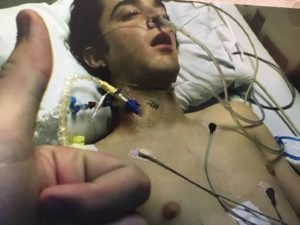 The successful donation-transplant surgery took place on February 21, 2007, at the Mayo Clinic in Phoenix, Arizona. My uncle was able to make a slow and steady recovery after donating. Due to the severity of my illness, as well as the medical complexity of managing a fresh transplant, my initial post-transplant course was a bit rocky. I was lucky I had such a dedicated and gifted transplant team who continuously worked to address the many challenges I faced during my recovery. I guess it's true what they say: anything worth having is worth working for.I spent most of the next three months in the hospital. With the love and patience of my family—and the determined work of the medical team, led by transplant surgeon Dr. David Mulligan—I was able to return to college that August. Once I resumed my normal life, the whole experience gave me a newfound perspective that I wanted to share with other patients and their families in the throes of the transplantation process: the harrowing experience of those few short months did not determine how wonderful life after transplant can be.It was around this time that I first encountered Chris Klug's liver transplant story and his own battle with PSC. In 2007, I didn't know of any other young adults who had received transplants and I often felt alone in my struggle. Learning about Chris' story taught me that a quality of life after transplantation was possible with the right amount of optimism and determination. A transplant is more than receiving a new organ—it's receiving a new opportunity.As inspiring as Chris' story is, I knew I would never bring home an Olympic medal in snowboarding—not because of my liver transplant, but because I can barely make it down a bunny-hill. Like Chris however, my experience going through transplant continues to be a source of inspiration and motivates me to make the most of my good health.In fact, the many challenges I faced and persisted through during my illness actually inspired me to become a physician. After graduating from the University of Arizona, I packed my bags and headed east to attend medical school at Yale University.Amazingly, the surgeon who performed my transplant, Dr. David Mulligan, was appointed head of transplant at Yale during my second year of medical school. Working with him as a student, rather than being his patient, reminded me of where I came from and what I wanted to accomplish. It was people like Dr. Mulligan who played important roles in providing me with all the opportunities I've had and, because of that, I wanted to give back and create those same opportunities for other people.
The successful donation-transplant surgery took place on February 21, 2007, at the Mayo Clinic in Phoenix, Arizona. My uncle was able to make a slow and steady recovery after donating. Due to the severity of my illness, as well as the medical complexity of managing a fresh transplant, my initial post-transplant course was a bit rocky. I was lucky I had such a dedicated and gifted transplant team who continuously worked to address the many challenges I faced during my recovery. I guess it's true what they say: anything worth having is worth working for.I spent most of the next three months in the hospital. With the love and patience of my family—and the determined work of the medical team, led by transplant surgeon Dr. David Mulligan—I was able to return to college that August. Once I resumed my normal life, the whole experience gave me a newfound perspective that I wanted to share with other patients and their families in the throes of the transplantation process: the harrowing experience of those few short months did not determine how wonderful life after transplant can be.It was around this time that I first encountered Chris Klug's liver transplant story and his own battle with PSC. In 2007, I didn't know of any other young adults who had received transplants and I often felt alone in my struggle. Learning about Chris' story taught me that a quality of life after transplantation was possible with the right amount of optimism and determination. A transplant is more than receiving a new organ—it's receiving a new opportunity.As inspiring as Chris' story is, I knew I would never bring home an Olympic medal in snowboarding—not because of my liver transplant, but because I can barely make it down a bunny-hill. Like Chris however, my experience going through transplant continues to be a source of inspiration and motivates me to make the most of my good health.In fact, the many challenges I faced and persisted through during my illness actually inspired me to become a physician. After graduating from the University of Arizona, I packed my bags and headed east to attend medical school at Yale University.Amazingly, the surgeon who performed my transplant, Dr. David Mulligan, was appointed head of transplant at Yale during my second year of medical school. Working with him as a student, rather than being his patient, reminded me of where I came from and what I wanted to accomplish. It was people like Dr. Mulligan who played important roles in providing me with all the opportunities I've had and, because of that, I wanted to give back and create those same opportunities for other people.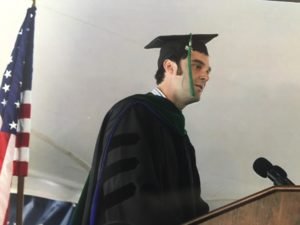 When I think back on all the medical professionals who helped keep me in good spirits and ultimately shaped my interest in working at a hospital, I am filled with an immense amount of gratitude. I am eternally grateful for so many things: the physicians who inspired me with their scientific approach, building a kindred curiosity in me along the way; the nurses who buoyed my spirits and encouraged my ambitions in the most trying of moments—and who advocated tirelessly for me in my time of illness and uncertainty; and the certified nursing assistants and other medical staff who provided friendly care and hope during the tedious days of my hospitalizations.Even though everything in my life seemed to revolve around my illnesses, the illnesses were not my life. Once I received my new liver, more than anything else, I wanted to break free of the feeling that my day-to-day existence was all about being sick. It was hard being reminded several times a day (when I would take my medications) and found myself coordinating my schedule around follow-up doctors' appointments and medical tests. My efforts were further challenged when I ended up facing an onslaught of complications and regular hospitalizations over the next several years after my transplant. Even to this day, I haven't escaped the routine of taking my medications and the occasional hospitalizations to deal with certain medical issues directly—or collaterally—related to my transplant.However, all these experiences and everything I learned during
When I think back on all the medical professionals who helped keep me in good spirits and ultimately shaped my interest in working at a hospital, I am filled with an immense amount of gratitude. I am eternally grateful for so many things: the physicians who inspired me with their scientific approach, building a kindred curiosity in me along the way; the nurses who buoyed my spirits and encouraged my ambitions in the most trying of moments—and who advocated tirelessly for me in my time of illness and uncertainty; and the certified nursing assistants and other medical staff who provided friendly care and hope during the tedious days of my hospitalizations.Even though everything in my life seemed to revolve around my illnesses, the illnesses were not my life. Once I received my new liver, more than anything else, I wanted to break free of the feeling that my day-to-day existence was all about being sick. It was hard being reminded several times a day (when I would take my medications) and found myself coordinating my schedule around follow-up doctors' appointments and medical tests. My efforts were further challenged when I ended up facing an onslaught of complications and regular hospitalizations over the next several years after my transplant. Even to this day, I haven't escaped the routine of taking my medications and the occasional hospitalizations to deal with certain medical issues directly—or collaterally—related to my transplant.However, all these experiences and everything I learned during 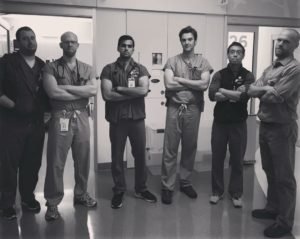 my medical journey inspired me so much that I decided to practice pediatric medicine. Dealing with a serious illness is a major part of a person's life, but it should never be a defining part of their life. After finishing medical school, I moved to Seattle to complete my pediatric residency at Seattle Children's Hospital. There, I met my wife Alison, a pediatric cardiology/transplant nurse, while working night shift as an intern. Since then, Alison and I have remained happily in Seattle and recently adopted a puppy, a Golden Retriever named Jeff. I'm currently in my second year of my Pediatric Nephrology fellowship and my research focus is on helping young patients with severe illness (including transplants!) maintain their kidney health and live long and active lives.I'll conclude with a question I am frequently asked: does it ever feel strange knowing my uncle's liver is residing within me? To be honest, it feels completely natural, which I attribute to the sincere love and kindness of my Uncle Jim. The familial context he gave to the whole process made the transplant less of a "gift" or donation and more of a natural transfer of opportunity and purpose, which I now work to share with the next generation of patients as a physician.
my medical journey inspired me so much that I decided to practice pediatric medicine. Dealing with a serious illness is a major part of a person's life, but it should never be a defining part of their life. After finishing medical school, I moved to Seattle to complete my pediatric residency at Seattle Children's Hospital. There, I met my wife Alison, a pediatric cardiology/transplant nurse, while working night shift as an intern. Since then, Alison and I have remained happily in Seattle and recently adopted a puppy, a Golden Retriever named Jeff. I'm currently in my second year of my Pediatric Nephrology fellowship and my research focus is on helping young patients with severe illness (including transplants!) maintain their kidney health and live long and active lives.I'll conclude with a question I am frequently asked: does it ever feel strange knowing my uncle's liver is residing within me? To be honest, it feels completely natural, which I attribute to the sincere love and kindness of my Uncle Jim. The familial context he gave to the whole process made the transplant less of a "gift" or donation and more of a natural transfer of opportunity and purpose, which I now work to share with the next generation of patients as a physician.